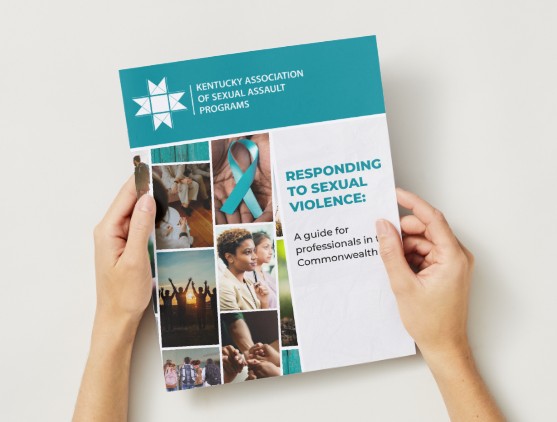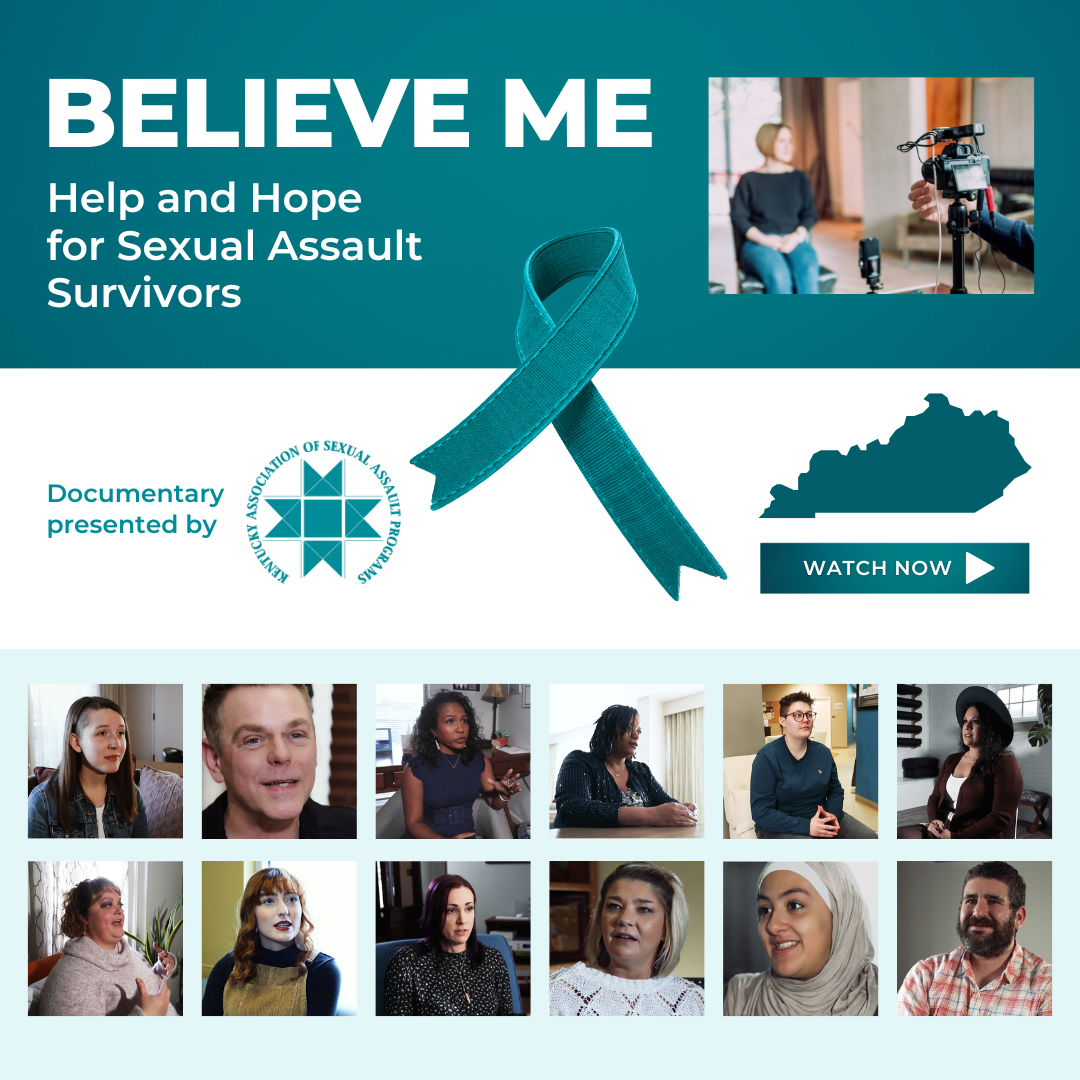
Access Healing Project
Expanding Support for Survivors Across Kentucky
At the Kentucky Association of Sexual Assault Programs (KASAP), we are dedicated to ensuring that all survivors of sexual violence have access to the resources and support they need. We recognize that barriers—whether geographic, financial, social, or personal—can prevent individuals from seeking help. To address these challenges, we launched the Access Healing Project, a series of initiatives designed to improve outreach, enhance services, and expand awareness about available resources.
Through direct collaboration with survivors, community members, and professionals, the Access Healing Project seeks to make services more effective and accessible across Kentucky. By listening to those affected by sexual violence and working with experts in healthcare, advocacy, and law enforcement, we continue to refine our approach to survivor support. Below is an overview of the key initiatives under this project.
Access Healing Project Timeline
April 2022
KASAP is awarded a $750,000 grant from Kentucky’s Cabinet for Health and Family Services to expand access to healing services for sexual assault survivors.
July 2022
The Access Healing Council is formed. We meet monthly to discuss the impacts of sexual violence.
Aug-Dec 2022
Council members meet with their local rape crisis centers and present at the Annual Conference for Ending Sexual Violence.
Jan-May 2023
The Council consults on a statewide marketing plan to increase awareness of our services, and an education/training plan to ensure our services are available to all.
June 2023
New council members are added for 2023-2024
Aug-May 2024
The Access Healing Council continues to meet monthly, and begins to plan the first Access Healing Summit.
May 2024
Approximately 100 attendees gather in Bowling Green Kentucky for the first Access Healing Summit, a one-day training about the intersections of substance use, trauma, and sexual violence.
May 2025
Building on the success of the first Access Healing Summit, a second summit took place in May 2025 with around 100 professionals in attendance.
Summer 2025
The Access Healing Project concludes.
Access Healing Project Advisory Council
Launched in July 2022, the Access Healing Project Advisory Council was created to ensure that survivors’ voices were at the center of KASAP’s work. The council was composed of approximately 35 Kentuckians who have been impacted by sexual violence and bring unique perspectives on the challenges faced by survivors in different communities.
The Advisory Council met monthly to discuss how sexual violence affects different groups, identify gaps in services, and provide direct input on KASAP’s initiatives. These discussions help shape policy recommendations, improve outreach strategies, and strengthen partnerships with local rape crisis centers.
One of the council’s primary goals was to ensure that all survivors feel welcome and supported when they seek help. By addressing issues such as mistrust in institutions, cultural stigma, and geographic barriers, the council helps KASAP and its member centers become more responsive to the real needs of survivors across the state.
Statewide Awareness Campaign
Between January and May 2023, the Advisory Council played a key role in shaping KASAP’s first statewide marketing campaign focused on increasing awareness of available survivor services. This initiative was designed to reach underserved and underrepresented survivors, ensuring that no one feels isolated or without options for support.
The campaign used radio, television, social media, and print materials to spread the message that help is available for anyone affected by sexual violence. It also focused on reducing stigma around seeking services by sharing survivor testimonials and educational content about the impact of sexual violence.
A key component of the campaign was ensuring that service providers were easy to find. The effort included an updated online resource directory and outreach materials that helped connect survivors to the appropriate rape crisis centers in their region.
Access Healing Summit
The Access Healing Summit is an annual conference dedicated to addressing the connection between substance use and sexual violence—a complex issue that is often overlooked. Many survivors experience barriers to services due to substance use, and many service providers struggle with how to best support these individuals.
The Access Healing Summit occured on May 10, 2024 and May 9, 2025, at the Knicely Conference Center in Bowling Green, Kentucky. This one-day event brought together medical professionals, legal experts, advocates, and service providers to discuss:
The impact of trauma on substance use and addiction
Best practices for supporting survivors with substance use disorders
Strategies for reducing barriers to survivor services
Legal considerations and advocacy efforts related to this intersection
The summit served as a space for professionals to exchange ideas, learn from experts, and develop strategies for ensuring that substance use does not prevent survivors from receiving the care and justice they deserve.
"Believe Me" Documentary Film
In April 2023, during Sexual Assault Awareness and Prevention Month, KASAP, in collaboration with PriceWeber, released Believe Me – Help and Hope for Sexual Assault Survivors. This hour-long documentary features compelling narratives from 12 survivors and counselors, aiming to raise awareness about the impact of sexual assault and highlight the resources available across Kentucky. The film aired statewide on Kentucky Educational Television (KET), reaching a broad audience and offering hope to those with similar experiences.
Believe Me has received significant recognition for its impactful storytelling and public awareness efforts:
Emmy Nomination: In June 2024, the documentary was nominated by the National Academy of Television Arts and Sciences (Ohio Valley Chapter) in the "Documentary – Cultural/Topical" category.
PRWeek Award: In March 2024, the documentary and its accompanying public relations initiatives earned the "Best in Community Relations" award at the PRWeek Awards held in New York City.
Telly Awards: In May 2024, Believe Me garnered two Bronze Telly Awards—one in the "Television – Public Interest & Awareness" category and another in the "Television – Documentary: Long Form (Above 40 minutes)" category.
PRNEWS Nonprofit Awards: Also in June 2024, the documentary received two honorable mentions from the PRNEWS Nonprofit Awards, recognized in the "Media Relations" and "PR or Marketing Campaign" categories.
PR Daily’s Media Relations Awards: In December 2023, PriceWeber and KASAP were honored with the top spot in the "Public Health" category category for their collaborative work on the documentary.
These accolades underscore the documentary's profound impact in raising awareness and providing support for sexual assault survivors across Kentucky.
Access Healing Podcast
Recognizing the power of storytelling and education, KASAP launched the Access Healing Podcast, a digital resource dedicated to discussing issues affecting survivors in Kentucky.
This podcast focuses on:
The unique barriers faced by survivors in rural areas
The experiences of survivors in marginalized communities
The intersection of substance use and sexual violence
How service providers can become more responsive to survivors' needs
Episodes feature survivors, advocates, mental health professionals, legal experts, and policymakers, offering a wide range of perspectives and expertise. The podcast serves as a valuable resource for survivors, their loved ones, and professionals working to improve services.
Revising the Guide for Professionals

Sharing Knowledge Nationwide
KASAP is dedicated not only to strengthening survivor services in Kentucky but also to sharing best practices with other states. By presenting at national conferences and collaborating with other state sexual assault coalitions, KASAP helps advance survivor advocacy across the country.
These presentations focus on:
Lessons learned from the Access Healing Project
Strategies for making services more accessible to all survivors
The importance of collaborating with survivors in shaping policy and services
By sharing insights and data from our initiatives, we contribute to a broader movement working to end sexual violence and improve support systems nationwide.
Looking Forward
While the current grant funding for the Access Healing Project is set to conclude in July 2025, our commitment to supporting survivors and improving access to services does not end there. The insights, strategies, and relationships built through this initiative will continue to guide KASAP and its member centers well beyond the grant period. We remain dedicated to applying the lessons learned, refining our approaches, and ensuring that all survivors, regardless of background or circumstances, can access the support they need. Moving forward, we will seek new opportunities to sustain and expand these efforts, integrating survivor-centered, responsive solutions into the fabric of our ongoing work.
Questions about the Access Healing Project?
Contact KASAP’s Access Healing Coordinator, Amy Turner
The Access Healing Podcast
A podcast for survivors of sexual violence, their friends, families, and professionals who work with them. We focus on the intersection of the BIPOC, LGBTQIA, and Substance Use communities, and their barriers to receiving services.
